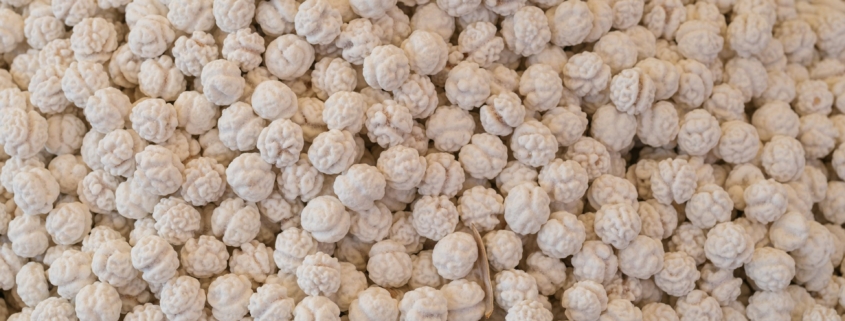Choosing the right chickpea seeds can make a big difference for your farm. It can affect how much you harvest and the quality of the chickpeas you grow. When selecting seeds, many factors come into play, such as the climate of your farm, the type of soil you have, and what the market needs. Getting these right can help you grow healthier and more abundant crops.
It’s important to consider how resistant the seeds are to diseases and how well they tolerate different weather conditions. Also, knowing the growth cycle and the time it takes for the plants to mature can help you plan better. The size of the seeds and the potential yield are crucial too. High germination rates and vigour are signs of strong seeds that will grow well in your fields. By investing in good quality seeds from trusted suppliers, you can ensure a productive and profitable farming season ahead.
Understanding these factors and how they influence your crop can help you make better choices. With carefully selected seeds, you can boost your farm’s production and meet the demands of your customers.
Understanding the Importance of Choosing the Right Chickpea Seed
Choosing the right chickpea seed is essential for your farm’s success. Seed selection directly affects the yield you get and the quality of the chickpeas you produce. High-quality seeds result in healthier plants that can produce more chickpeas. Poor seed selection, on the other hand, can lead to lower yields and poor-quality produce, which affects your profits.
When picking chickpea seeds, think about the climate of your farm. Some chickpea varieties thrive in specific weather conditions. Also, consider the soil type. Different seeds perform better in different soil types, whether sandy, clay, or loamy. Lastly, think about the market demand. Growing a variety that’s in high demand ensures you can sell your produce quickly and at a good price.
Key Factors to Consider When Selecting Chickpea Seeds
Disease Resistance and Tolerance
One major factor in seed selection is disease resistance. Chickpeas can be prone to several diseases like Ascochyta blight and Fusarium wilt. Picking seeds that are resistant to these diseases ensures healthier plants and better yields. Disease resistance reduces the need for chemical treatments, saving you time and money.
Growth Cycle and Maturation Period
Understanding the growth cycle and maturation period of the seeds you select is vital. Some chickpea varieties mature quickly, while others take longer. If your growing season is short, opt for a variety that matures early. This ensures the plants have enough time to grow and produce harvestable chickpeas.
Yield Potential and Seed Size
Yield potential is another key consideration. You want seeds that will produce a high number of chickpeas. Larger seeds often indicate robust growth and higher yield potential. Picking seeds that promise a good yield helps maximise your farm’s productivity and profits.
Consideration of Seed Purity, Germination Rates, and Vigour
Make sure the seeds you choose have high purity, germination rates, and vigour. Purity means the seeds are free from contaminants. High germination rates mean most seeds will sprout and grow into plants. Vigour refers to the seed’s ability to grow strong seedlings. Buying seeds with these qualities ensures a successful and productive growing season.
Comparing Popular Chickpea Varieties
Several chickpea varieties are available in Australia, each with unique traits. Some of the popular varieties include PBA Slasher, PBA Seamer, and Genesis 090. PBA Slasher is known for its high yields and adaptability to various climates. It works well in different soil types and has good disease resistance. PBA Seamer offers great resistance to Ascochyta blight and is an early maturing variety, making it perfect for shorter growing seasons.
Genesis 090 is another favourite. It’s a desi chickpea with excellent disease resistance and performs well in different environmental conditions. However, it might need more care in weed management compared to the other two varieties.
To choose the best variety for your farm, consider your specific needs. If you face a lot of disease issues, PBA Seamer might be the best fit. For higher yields and versatility, go with PBA Slasher. If you want a hardy variety that can thrive in multiple conditions, Genesis 090 could be your choice. Assessing your farm’s specific conditions and your goals helps in making the best decision.
Tips for Buying High-Quality Chickpea Seed
Where to source quality chickpea seeds is crucial. To get the best seeds, consider purchasing from trusted suppliers with good industry experience. Suppliers with a long track record often provide high-quality seeds with high germination rates.
Buying from experienced suppliers has its benefits. They offer the latest seed varieties that have been tested and proven to perform well. They also use state-of-the-art seed chemical applications to protect seeds from diseases and pests.
Follow these steps to ensure you are getting the best seeds:
– Research potential suppliers and read reviews.
– Ask about the source of the seeds and their testing methods.
– Check if the seeds come with information on germination rates and vigour.
– Look for suppliers who use modern seed treatments to ensure healthy crops.
Making sure you get high-quality seeds means better harvests and healthier plants.
Conclusion
Choosing the best chickpea seed for your farm is vital for a successful harvest and a profitable season. By understanding the importance of seed selection and considering factors like disease resistance, growth cycle, and seed quality, you can make informed choices. Knowing the differences between popular chickpea varieties helps in picking the perfect fit for your farm’s specific needs.
Additionally, sourcing seeds from trusted suppliers ensures you get the best quality, equipped with modern treatments to protect your crops. It all comes down to making smart decisions that will benefit your farm in the long run.
Ready to take the next step? Connect with Shepherd Grain today and let us help you find the best bulk chickpeas for your farm, ensuring a fruitful and successful growing season.




